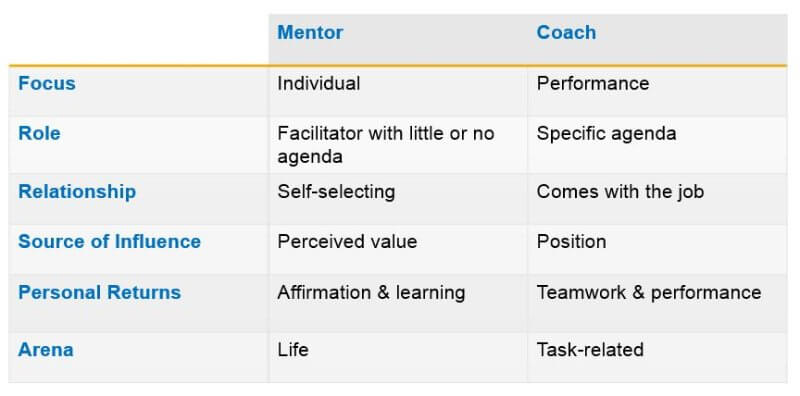In life, we all need a little help from our friends! Sometimes we need our friends to be more experienced than we are, more powerful than we are, independent of our careers, and available to us as a “sounding board.” We need our friends to be open and honest with us when hearing concerns, and sometimes we really need a reciprocal relationship.
This is where mentoring comes into play. Mentoring is a developmental partnership through which one person shares knowledge, skills, information and perspective to foster the personal and professional growth of someone else. We all have a need for insight that is outside of our normal life and educational experience. The power of mentoring is that it creates a one-of-a-kind opportunity for collaboration, goal achievement and problem-solving.
Mentoring is a brain to pick, an ear to listen, and a push in the right direction.
– John C. Crosby
In everyone’s life at some time, our inner fire goes out. It is then burst into flame by an encounter with another human being. We should all be thankful for those people who rekindle the inner spirit.
– Albert Schweitzer
A man I admire, Neal Maxwell, once said: “Each of us, from time to time, is mentored and has chances to mentor. In my experience, truthful and caring one-liners that occur within such nurturing relationships have a long shelf life! You can probably recount three or four examples of how people have said something – probably a sentence or clause – and you remember it still. It moves and touches you still. Such has been the case with me. . .”
A mentor oversees the career and development of another, usually junior person (often called the protégé). He or she helps the protégé clarify career goals and carry out a plan to reach those goals by sharing the insights and knowledge they have gained through their experiences. A mentor also:
- Coaches the protégé in enhancing skills and intellectual development
- Provides candid feedback about perceived strengths and developmental needs
- Points out opportunities to develop capabilities and points out pitfalls to avoid
- Advises on how to deal with real or perceived roadblocks
- Encourages, motivates, and serves as a sounding board
- Builds self-confidence and sense of self
- Links the protégé with others who can enhance learning
Mentor vs. Coach
A mentor is MUCH different than your coach. In fact, they (in almost all cases) should NOT be the same person. Each role has its own responsibilities when it comes to focus, role, relationship, source of influence, personal returns, and arena. Below is a graphic outlining these differences.
Finding a Mentor
You should spend a lot of time thinking about your needs before looking for a mentor. You should find someone you respect, who has been where you want to be, has the time to help you, and is outside your chain of command (as mentioned above). Mentoring is one of the competencies of a good leader. Good mentors are well-respected and fell a sense of pride at helping someone else succeed and in “giving back” to others.
Protégé Expectations and Benefits
Next to family, having a mentor can be one of the most beneficial relationships from both a personal and a business level that you can ever have. As a protégé, you should have specific expectations, however. You should expect your mentor to:
- give encouragement and support
- be honest with you (i.e. appraisal of abilities, discussion about tough issues)
- bring to light candid information and give straight-forward advice
- show you the big-picture view
- help with “vision”
- help in making good choices
- help in defining and reaching goals
If your mentor does this, it will help you increase your self-confidence, give you insight into career paths, assist you in accepting positive and constructive feedback in a more effective way, increase your interpersonal relationship skills, and much more. In addition, it will help you become a mentor yourself.
Always remember that amazing people don’t just happen. As Bob Proctor said: “A mentor is someone who sees more talent and ability within you, than you see in yourself, and helps bring it out of you.”




